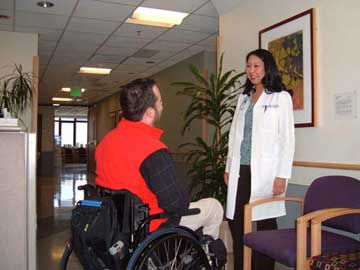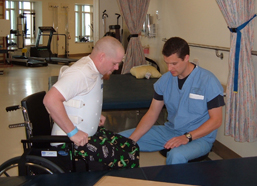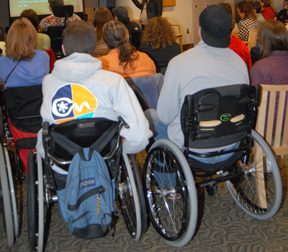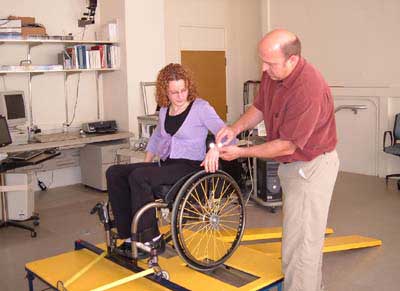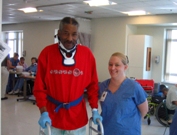SCI Forum Report & Video
Personal Caregivers: Tips, Tricks and Tales from Individuals with Spinal Cord Injury
Presented on April 8, 2008 at the University of Washington Medical Center.
At this forum, three individuals with longstanding quadriplegia described their experiences and shared tips for finding, hiring and managing personal caregivers. These presentations were followed by a brief talk by a UW rehabilitation psychologist about maintaining personal boundaries when working with a personal caregiver. Read the report of these presentations (below) or watch the video from this page.
Watch our latest SCI Forum video on this topic: "Managing Personal Caregivers: A Panel Discussion." (2016)
Presentation time 63 minutes. After watching the video, please complete our two-minute survey. Thank you!
You can also watch this video on YouTube.
For a complete list of our videos, click here.
Report
-
Individuals with SCI share experiences and information about using personal caregivers
-
Personal Boundaries and Caregivers, by Jeanne Hoffman, PhD
-
Resources
-
Washington State and Federal Employer Resources
-
Online Guides for Hiring and Managing Caregivers; Resources for Background Checks; Financial Support
-
Sample Employee Agreement (PDF)
-
Thoughts about attendants from an experienced RN whose husband has C-4 quadriplegia. (PDF)
-
Online chat/forum on the topic of personal caregivers for individuals with SCI.
-
Kirk
Kirk sustained a C5-6 spinal cord injury in a construction accident in 1983 and has been using personal caregivers ever since. “I can say unequivocally that attendants are a most critical part of my life,” he said. “They really help me to be more independent in many ways. Although I am dependent on them, I'm able to have a fuller life because of them.”
After more than seven months in the University of Washington Medical Center, Kirk was discharged home with 24-hour nursing care paid for by Labor and Industries insurance coverage. He eventually decided he would prefer to hire his own care. He learned about setting himself up as a business and paying the required taxes through his local Employment Security Department (ESD) office, where he applied for and received a business license and employer tax identification number. (See “Washington State and Federal Employer Resources” for more information.) He carries blanket liability coverage for injuries through his homeowners policy.
“I have tried lots of different avenues (for finding caregivers)” Kirk said. “The most successful and consistent has been the local newspaper.” When he first started placing ads, Kirk included lots of details, assuming that the more information he provided up front, the better chance he would have of getting appropriate applicants. He quickly learned that most people didn't pay attention to all those details, so he simplified it down to two lines about days, times, location and phone number (and saved money on the ad, too).
Kirk has had as many as 100 people respond to an ad. He conducts a thorough phone screening interview before inviting possible candidates to his home for a second interview. “I want them to see my place, the environment they're going to work in,” he said. “And I want to see how they show up, how they carry themselves, do they leave the chair out in the middle of the way beside the table so I can't get by while we walk around the house. If I said 'I'm looking for a non-smoker' on the phone and they show up and they reek of smoke, that's not a good solution for me.”
Kirk has learned that prior caregiver experience is not necessary and may even be a disadvantage. “You may be un-training what they learned in a previous position,” he said. “That’s particularly true if someone comes from years and years in a nursing home environment,” where they may have been used to being in control and making all the decisions for patients, rather than listening to their preferences. “I’d rather not have that, personally.”
Beyond the business-end of hiring caregivers is the thorny territory of interpersonal relationships. “Because you’re working with someone so closely, the boundaries can get a little fuzzy,” Kirk said. It’s easy to get into uncomfortable situations, such as when a caregiver asks for a favor that starts small and grows to the point of discomfort. For instance, people have asked Kirk if they could occasionally bring their child to work. And this is fine with him, until “occasionally” becomes most days, then every day. And when a child damages something in his home, things can get very awkward. “These are tough areas for me” he admitted.
“Some of the things that carry you through as much as any are humor and respect and pretty much setting the rules to begin with in a polite but firm tone, and then sticking with them,” Kirk advised. “Every time I’ve gotten into a jam it’s because I let those rules slip or those boundaries expand.”
(See Kirk's Resources page for guides to hiring and managing caregivers and information about background checks and financial support.)
Todd
In 1987, at the age of eight, Todd was accidentally shot by his young cousin. He sustained a complete C4 spinal cord injury. After 11 months at Children’s Regional Hospital and Medical Center, Todd was discharged home, and his mother, sister and grandfather became his full time caregivers.
Todd was a diligent student and completed college at age 18. He was hired as a software developer right after graduation and now, 11 years later, runs the company. “What does that looks like? It’s crazy,” he said. “I have three household employees, four independent contractors, a private physician, a financial planner, a bookkeeper, three banking institutions who run my life and enough financial software to run a business.”
Transitioning from family to hired caregivers was a difficult process but ultimately appropriate and rewarding. He wanted to separate his family relationships from his caregiving relationships and felt this was necessary in order to develop his own identity and grow into adulthood. He started small and transitioned in phases.
Todd’s approach to care starts with the basic truth that “To exist, I need help. To live, I need care,” and is guided by the principles of open communication, mutual respect, clear expectations and a safe work environment. He encourages personal growth among his caregivers and sees his care system as a team effort with a common goal.
Todd has no movement below his shoulders, so his care is by necessity a well-oiled machine, consisting of highly detailed routines, checklists, written agreements and communication systems that he has carefully crafted and compiled into a comprehensive care manual. This streamlined system works for him because “the process is consistent. All parties sign off on the structure. Rules remain tight and focused—there are no gray areas. The process doesn’t make compromises. The structure doesn’t feel guilty. It doesn’t get upset. It’s on paper. People read it and know it.”
Todd holds regular staff meetings to bring the team up-to-date and give everyone a voice. He posts a four month calendar showing responsibilities and personnel for each shift, as well as a "body board," which is a picture of his body, front and back, showing any areas of concern. Employees get regular performance reviews, which Todd sees as an opportunity for mutual learning. Todd pays $13 per hour to start and goes as high as $25, depending on the job responsibilities and performance. He recommends investing in a keyless entry, a simpler and safer alternative to distributing keys and possibly having to change the locks if something goes wrong.
When it comes to finding potential caregivers, “word of mouth works best for me,” Todd said. “I tell everybody about my needs.” He posts flyers at nursing schools and church bulletin boards. Anyone who calls and seems promising gets a full vetting, from checking references to searching Google, MySpace, arrest records and more. His first meeting with candidates takes place away from home. He will often pay a potential employee to watch routines before hiring because “It’s better to know red flags ahead of time rather than several pay periods later,” he said.
Firing employees is hard and uncomfortable and needs to be done carefully and thoughtfully. He views exit interviews as a two-way street: “I learn from each one, for sure.” Through unpleasant past experience, he has developed some simple advice: “Don’t fire somebody from your bed; maybe wait until you’re in your wheelchair or when somebody is with you. If the person is intoxicated, consider firing the person outside. Immediately call the key people in your life. Immediately change the door code.”
(See a sample of Todd's "Caregiver Qualifications and Agreement.")
Sigrid
Sigrid has lived with quadriplegia for 17 years and has had very positive experiences with hired personal caregivers. “Once I hire someone I tend to keep them for a long time,” she said. Indeed, she currently has four caregivers that have been with her from 8 to 14 years, and she considers all of them to be good friends. “You keep them by respecting them, communicating, being flexible. It’s really important that you like your caregivers and work well together.”
Sigrid finds her caregivers through newspaper ads. She prefers to hire female caregivers only. She screens candidates over the phone, and if they don’t communicate effectively or she can’t understand them, she doesn’t pursue them further. “Communication is important in your personal care,” she said. She interviews people at a neutral location like Starbucks. If they pass the first interview, they are invited to her home for a second interview.
She doesn’t check references because she has learned that employers usually won’t give a bad one. Instead, “I go with my gut,” she said. “I want people who have a sense of caring, that it’s not just a job. I’m not good at firing people, so I have to be really careful hiring people. Knowing yourself is key to hiring good people.”
Sigrid is easy going and flexible with her caregivers and has few rules, “except when it comes to my clothing,” she admitted, chuckling. “I’m extremely particular about how my clothes are hung, washed and put on me!” Another rule is “I’m the only nude person in my house.” She doesn’t want to see or hear about her caregivers’ bodies, tattoos or anatomical peculiarities.
Flexibility is a two-way street. “I’m always late, so it’s hard for me to get mad at my caregivers (if they are late),” Sigrid said. “The shift is 7:00 pm to 10:30 pm, but sometimes I don’t get home until quarter to eight, which means the caregiver will get off late, too.” She hires for three-hour shifts, but if a long-term employee is really good and can get her job done in two hours, she’ll still get paid for three hours.
Even though her caregivers tend to become friends, she keeps the roles clear and the personal boundaries from getting blurred. “Caregivers are my life and are here to take care of me. Of course you want to help them out and be supportive and understanding, but when I start taking care of them, that’s a problem.”
Sigrid does not use the ‘business model” of hiring caregivers like Kirk and Todd. On her attorney’s advice, she pays her caregivers as independent contractors. Wages range from $13 per hour to start to $16 for her longer-term employees. Her advice to others for hiring caregivers: “Use your best judgment. And remember, you’re hiring a friend.”
Personal Boundaries and Caregivers
Jeanne Hoffman, PhD, UW Rehabilitation Psychologist
Personal boundaries refer to those invisible borders that separate your psychological and emotional space from someone else’s, explained Jeanne Hoffman, PhD, rehabilitation psychologist at UW Medical Center. They are defined by the expectations we all have about appropriate behavior and roles in a relationship. “So you might share close personal details with your best friend but not someone you just met,” she said. “Boundaries vary depending on the person and the situation.”
Caregiver relationships are very complicated, starting with the fact that “you now have to have somebody help you where you never had to before,” Hoffman said. “And often this involves intimate care in which someone is seeing you naked, someone is doing your bowel program. That’s a very different level of help than asking somebody to get something off the shelf in a grocery store, and it leads to feeling vulnerable.”
Often it is family or loved ones who become caregivers for individuals with spinal cord injury, and this can cause problems because there are so many different roles people play in each other’s lives. A family caregiver may decide to “take over” and make all the decisions because they think it will make it easier for the person or they feel they know what’s best. On the other hand, the person needing care may expect their spouse or loved one to be available every minute of every day.
Potential problems with hired caregivers include such things as the hired person asking for favors, first on a small scale or infrequently, but then becoming more common or more intrusive. Or the problem can go the other way, such as asking a caregiver to do something that is not in the job description or is outside the agreed-upon expectations. There are many examples of pushing personal boundaries and they can go both ways.
One way to avoid these problems is to maintain as much independence as possible, Hoffman said. “This means taking responsibility for directing your care and making choices about your care. It puts you back in the driver seat.”
Why is this such a hard thing? People frequently worry about being a burden, so they may not ask for what they really want. They want to keep the caregivers “happy” so they are more likely to stick around. Or they may find that it’s simply easier to let someone else make the decisions. But giving up on all your own preferences can easily slip into losing a sense of self. Taking control over what you can control eases the burden of decision making and leads to more satisfying situations because you get things done your way.
“Another part of being independent is being assertive in your interactions,” Hoffman continued. “A lot of people have difficulty with this because they often confuse communication that’s assertive with being aggressive or feel that if you tell people what you want, you’re being demanding and difficult.” However, there is an important distinction. An aggressive approach is inflexible, “my way or no way, and whatever you want doesn’t matter,” Hoffman explained. A passive approach says the other person's needs and wants are more important than mine. Passive-aggressive people, on the other hand, manipulate others into thinking they got their way when they didn’t. The assertive approach says “let’s negotiate. I want X and you want Y, so let’s talk,” Hoffman said. “Being assertive doesn’t mean you always get what you want, but it guarantees that you get to express your wants and needs. People often forget that if they just tell people what they want, they might actually get it.”
“How do you exert independence and assertiveness with your mother or your wife or husband? You talk about what you both need,” Hoffman said. “And you recognize the fact that there is a dual relationship going on, that you’re not going to want your spouse to help you with a bowel program and then have sex, or that you’re not going to want your parents help you get ready for a date and then ask you about your Foley (catheter) on the way out the door. You have to communicate about how the relationship is changing and how to come to a solution that works for both of you.”
With paid caregivers, Hoffman thinks it’s best to approach hiring caregivers as a business. “It ensures that you set up boundaries at the start. Think of it as your own home-based business. What would you expect from a good employee? What would you expect if you were an employee?” Decide up front how you’re going to handle pay and time off as well as special requests like pay advances, tardiness or bringing children to work.
Hoffman strongly recommends planning ahead for what you will do if someone suddenly walks out, threatens to leave or needs to be fired. Have an emergency plan, such as a family member or an agency that can provide help until you hire someone new.
How often do personal boundaries get blurred? “Again and again,” Hoffman said. “But you always have an opportunity to start over, to have a discussion, to put those boundaries back in place and be more clear about them.” Problems with personal boundaries are common for many people in the general population, not just those needing caregivers, and professional counseling can be very helpful with sorting out boundary struggles.
Online chat/forum on the topic of personal caregivers for individuals with SCI.
- CareCure forum for caregivers. Go to http://sci.rutgers.edu and click on the “Caregiving” section.

